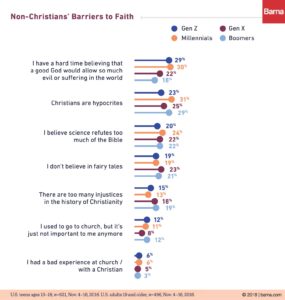It looks like Gen Z, the age group with older members just now graduating from high school, wants as little or less from religious organizations than their Millennial predecessors.
That may come as little surprise to churches, nonprofits and businesses that have been trying for years to prove their relevance to younger generations that distrust institutions across the board.

But those assumptions are now being borne out by emerging research demonstrating that Gen Z may likely deliver even higher doses of rejection to religious groups.
New research published by Barna in cooperation with the Impact 360 Institute elicited responses indicating little interest in matters of faith for the up-and-coming wave of Americans born roughly between 1995 and 2015.
When asked to identify items that are “very important to my sense of self,” religion and religious beliefs scored relatively low (22 percent) compared to professional and educational development (43 percent), hobbies and pastimes (42 percent) and gender and sexuality (37 percent).
Categories the generation members identified as least important included social and economic class and political affiliation. Both categories came in at 13 percent.
As a whole, Barna found that members of Gen Z are interested in finishing their educations, starting careers and becoming financially independent at percentages exceeding Millennials.
Earlier research sheds more light on religious leanings of Gen Z.
A survey conducted by Barna and the Impact 360 Institute in January found the emerging generation more likely to abandon belief in God than older U.S. residents.
“They might be drawn to things spiritual, but with a vastly different starting point from previous generations, many of whom received a basic education on the Bible and Christianity,” researchers said in the Jan. 24 report. “The percentage of Gen Z that identifies as atheist is double that of the U.S. adult population.”

While 42 percent of that younger generation identified as non-Catholic Christian and 17 percent as Catholic, 13 percent said they are atheist.
That compares to 7 percent of Millennials, 6 percent of Gen Xers, 5 percent of Boomers and 6 percent of Elders.
Another 14 percent identified with none of those faith categories.
Asked about barriers to belief, 29 percent of Gen Z members said it’s because “I have a hard time believing a good God would allow so much suffering in the world.”
Others (23 percent) said it’s because “Christians are hypocrites,” while fewer said “science refutes too much of the Bible” and “I don’t believe in fairy tales.”
“More than one-third of Gen Z … believes it is not possible to know for sure if God is real, compared to 32 percent of all adults,” the report’s authors said.
Those attitudes are in keeping with the ongoing cultural trend of embracing relativism, according to the report. More than half of Americans, teens and adults, at 58 percent, believe all faiths lead to salvation.
“There’s a sense among Gen Z that what’s true for someone else may not be ‘true for me’” according to the report.
